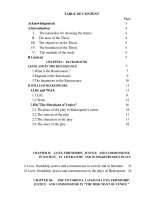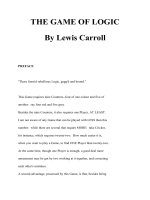The Countess of Escarbagnas by Moliere
Bạn đang xem bản rút gọn của tài liệu. Xem và tải ngay bản đầy đủ của tài liệu tại đây (72.08 KB, 11 trang )
The Countess of Escarbagnas
by
Moliere
Web-Books.Com
The Countess of Escarbagnas
'La Comtesse d'Escarbagnas' was acted before the Court at Saint- Germain-en-Laye, on
December 2, 1671, and in the theatre of the Palais Royal on July 8, 1672. It was never
printed during Molière's lifetime, but for the first time only in 1682. It gives us a good
picture of the provincial thoughts, manners, and habits of those days.
PERSONS REPRESENTED
THE COUNT, son to the COUNTESS.
THE VISCOUNT, in love with JULIA.
MR. THIBAUDIER, councillor, in love with the COUNTESS.
MR. HARPIN, receiver of taxes, also in love with the COUNTESS.
MR. BOBINET, tutor to the COUNT.
JEANNOT, servant to MR. THIBAUDIER.
CRIQUET, servant to the COUNTESS.
THE COUNTESS OF ESCARBAGNAS.
JULIA, in love with the VISCOUNT.
ANDRÉE, maid to the COUNTESS.
The scene is at Angoulême.
SCENE I.--JULIA, THE VISCOUNT.
VISC. What! you are here already?
JU. Yes, and you ought to be ashamed of yourself, Cléante; it is not right for a lover to be
the last to come to the rendezvous.
VISC. I should have been here long ago if there were no importunate people in the world.
I was stopped on my way by an old bore of rank, who asked me news of the court, merely
to be able himself to detail to me the most absurd things that can well be imagined about
it. You know that those great newsmongers are the curse of provincial towns, and that
they have no greater anxiety than to spread, everywhere abroad all the tittle-tattle they
pick up. This one showed me, to begin with, two large sheets of paper full to the very
brim with the greatest imaginable amount of rubbish, which, he says, comes from the
safest quarters. Then, as if it were a wonderful thing, he read full length and with great
mystery all the stupid jokes in the Dutch Gazette, which he takes for gospel. [Footnote:
After the peace of Aix-la-Chapelle in 1668, this newspaper never ceased to attack Louis
XIV. and the French nation. In 1672 Louis XIV. attempted the conquest of Holland.] He
thinks that France is being brought to ruin by the pen of that writer, whose fine wit,
according to him, is sufficient to defeat armies. After that he raved about the ministry,
spoke of all its faults, and I thought he would never have done. If one is to believe him,
he knows the secrets of the cabinet better than those who compose it. The policy of the
state is an open book to him, and no step is taken without his seeing through it. He shows
you the secret machinations of all that takes place, whither the wisdom of our neighbours
tends, and controls at his will and pleasure all the affairs of Europe. His knowledge of
what goes on extends as far as Africa and Asia, and he is informed of all that; is
discussed in the privy council of Prester John [Footnote: The name given in the middle
ages to a supposed Christian sovereign and priest (presbyter) in the interior of Asia.] and
the Great Mogul.
JU. You make the best excuse you can, and so arrange it that it may pass off well and be
easily received.
VISC. I assure you, dear Julia, that this is the real reason of my being late. But if I
wanted to say anything gallant, I could tell yon that the rendezvous to which you bring
me here might well excuse the sluggishness of which you complain. To compel me to pay
my addresses to the lady of this house is certainly reason enough for me to fear being
here the first. I ought not to have to bear the misery of it, except when she whom it
amuses is present. I avoid finding myself alone with that ridiculous countess with whom
you shackle me. In short, as I come only for your sake, I have every reason to stay away
until you are here.
JU. Oh! you will never lack the power of giving a bright colour to your faults. However,
if you had come half an hour sooner, we should have enjoyed those few moments. For
when I came, I found that the countess was out, and I have no doubt that she is gone all
over the town to claim for herself the honour of the comedy you gave me under her name.
VISC. But, pray, when will you put an end to this, and make me buy less dearly the
happiness of seeing you?
JU. When our parents agree, which I scarcely dare hope for. You know as well as I do
that the dissensions which exist between our two families deprive us of the possibility of
seeing each other anywhere else, and that neither my brothers nor my father are likely to
approve of our engagement.
VISC. Yes; but why not profit better by the opportunity which their enmity gives us, and
why oblige me to waste, under a ridiculous deception, the moments I pass near you?
JU. It is the better to hide our love; and, besides, to tell you the truth, this deception you
speak of is to me a very amusing comedy, and I hardly think that the one you give me to-
day will amuse me as much. Our Countess of Escarbagnas, with her perpetual infatuation
for "quality," is as good a personage as can be put on the stage. The short journey she has
made to Paris has brought her back to Angoulême more crazy than ever. The air of the
court has given a new charm to her extravagance, and her folly grows and increases every
day.
VISC. Yes; but you do not take into consideration that what amuses you drives me to
despair; and that one cannot dissimulate long when one is under the sway of love as true
as that which I feel for you. It is cruel to think, dear Julia, that this amusement of yours
should deprive me of the few moments during which I could speak to you of my love,
and last night I wrote on the subject some verses that I cannot help repeating to you, so
true is it that the mania of reciting one's verses is inseparable from the title of a poet:
"Iris, too long thou keepst on torture's rack
One who obeys thy laws, yet whisp'ring chides
In that thou bidst me boast a joy I lack,
And hush the sorrow that my bosom hides.
Must thy dear eyes, to which I yield my arms,
From my sad sighs draw wanton pleasure still?
Is't not enough to suffer for thy charms
That I must grieve at thy capricious will?
This double martyrdom a pain affords
Too keen to bear at once; thy deeds, thy words,
Work on my wasting heart a cruel doom,
Love bids it burn; constraint its life doth chill.
If pity soften not thy wayward will,
Love, feigned and real, will lead me to the tomb."
JU. I see that you make yourself out much more ill--used than you need; but it is the way
with you poets to tell falsehoods in cold blood, and to pretend that those you love are
much more cruel than they are, in order to make them correspond to the fancies you may
take into your heads. Yet, I should like you, if you will, to give me those verses in
writing.
VISC. No, it is enough that I have repeated them to you, and I ought to stop there. A man
may be foolish enough to make verses, but that is different from giving them to others.
JU. It is in vain for you to affect a false modesty; your wit is well known, and I do not
see why you should hide what you write.
VISC. Ah! we must tread here with the greatest circumspection. It is a dangerous thing to
set up for a wit. There is inherent to it a certain touch of absurdity which is catching, and
we should be warned by the example of some of our friends.
JU. Nonsense, Cléante; I see that, in spite of all you say, you are longing to give me your
verses; and I feel sure that you would be very unhappy if I pretended not to care for them.
VISC. I unhappy? Oh! dear no, I am not so much of a poet for you to think that I ... but
here is the Countess of Escarbagnas; I'll go by this door, so as not to meet her, and will
see that everything is got ready for the play I have promised you.
SCENE II.--THE COUNTESS, JULIA; ANDRÉE and CRIQUET in the background.
COUN. What, Madam, are you alone? Ah! what a shame! All alone! I thought my people
had told me that the Viscount was here.
JU. It is true that he came, but it was sufficient for him to know that you were not at
home; he would not stop after that.
COUN. What! did he see you?
JU. Yes.
COUN. And did he not stop to talk with you?
JU. No, Madam; he wished to show you how very much he is struck by your charms.
COUN. Still, I shall call him to account for that. However much any one may be in love
with me, I wish them to pay to our sex the homage that is due to it. I am not one of those
unjust women who approve of the rudeness their lovers display towards other fair ones.
JU. You must in no way be surprised at his conduct. The love he has for you shows itself
in all his actions, and prevents him from caring for anybody but you.
COUN. I know that I can give rise to a strong passion; I have for that enough of beauty,
youth, and rank, thank Heaven; but it is no reason why those who love me should not
keep within the bounds of propriety towards others. (Seeing CRIQUET.) What are you
doing there, little page? is there not an ante-room for you to be in until you are called? It
is a strange thing that in the provinces we cannot meet with a servant who knows his
place! To whom do you think I am speaking? Why do you not move? Will you go
outside, little knave that you are!
SCENE III.--THE COUNTESS, JULIA, ANDRÉE.
COUN. Come hither, girl.
AND. What do you wish me to do, Ma'am?
COUN. To take off my head-dress. Gently, you awkward girl: how roughly yon touch
my head with your heavy hands!
AND. I do it as gently as I can, Ma'am.









